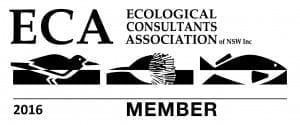Why the Association was formed
Ecology is a field characterised by rapid growth and increasing complexity. Ecological assessment is an integral component of modern planning and management. During the past 20 years NSW has introduced some of the most comprehensive and powerful fauna and flora protection legislation in Australia and the world reflecting the global trend toward introduction of ecologically sustainable development.
Prior to the inception of the ECA, experts and practitioners in the field have had no professional body to oversee crucial processes such as accreditation, further education, training, standards, ethics, information exchange and negotiation with government and policy makers. While experience, basic training in ecological and environmental science and technology are required, they are no longer sufficient for the practicing ecologist. Ecological consultants must now be client educators, policy and decision-makers, mediators, planners, business managers and innovators.
Goals
- To represent practising ecological consultants in New South Wales (NSW).
- To liaise with regulatory authorities and other bodies on matters relevant to the practice of ecological consultants in NSW.
- To co-operate with other bodies or organisations and institutions both within Australia and overseas having objects in whole or in part similar to the objects of the Association.
- To prepare and support guidelines and standards relevant to the practice of ecological consultants in New South Wales, including but not limited to:
- accreditation of consultants;
- standards for the practice of methods used by ecological consultants;
- peer review of work of ecological consultants;
- code of ethics to be followed by practising ecological consultants.
- To initiate, co-ordinate or undertake training programs, seminars, and etc. for the betterment of the practice of ecological consultancy in NSW.
- To undertake any activity which in the opinion of the Council of the Association is calculated to promote the interests of ecological consultants in NSW and elsewhere.
Financial Summary
The ECA acquires funding through annual membership, workshop and conference fees, as well as website and newsletter advertising. The list below gives an indication of the proportion of this money spent annually on each category. The book stall does not make a profit, unless books are donated to the stall for sale.
Approximate annual expenditure
| Conference | 19% |
| Administrative Assistant wages & other office expenses | 48% |
| Workshop | 11% |
| Book Stall expenses | 3% |
| Insurance | 2% |
| Printing | 10% |
| Website maintenance | 6% |
| Donations (i.e. Lymes Disease Research; Victorian Bushfire Appeal) | 1% |

